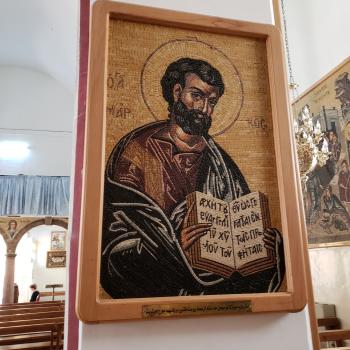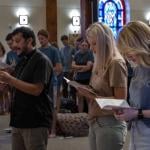A couple of years ago I wrote a book for Abingdon entitled A Shared Christian Life, deal with the issue of spiritual formation in a Wesleyan form. I stressed, as I will stress in this post, that the primary place most human beings are going to get spiritually formed is in the context of the congregation– whether it be congregational worship, or the sharing of the Eucharist, or on retreat with a Bible study group, or a fellowship meal in church or in a home. Spiritual formation is not primarily accomplished by becoming a monk, not at least for most Christians living a normal Christian life with family and job and the like.
Yes, there is a place for being alone with God, or going out in the woods and praying for a length of time, or making a pilgrimage to some holy place. Obviously there is a place for quiet Bible reading and reflection. My point however is that most of the way God reaches us, shapes us, forms is not privately. Indeed, God often shapes us in the ‘ordinary’ whether in a crowd or all alone.
For example, I play golf once a week. I play 99% of the time by myself, and prefer to be there early in the morning and be first out on the course walking and carrying my clubs. The sun’s coming up over the Bluegrass, the robins are hopping around and chirping, there is dew on the grass, and I am enjoying a few good golf shots while getting a bit of exercise. But what I am also doing is absorbing, appreciating, and praising God for his beautiful creation. Call it a little creation spiritual formation. In order for this to work however I have to take an approach to my golf game that doesn’t involve a lot of negativity or striving to ‘win’ or anything like that. No, I am just enjoying hitting a few good shots, making a couple of pars maybe, and otherwise enjoying a walk in the woods. What has impressed me about these times I have is that often some of my best thoughts, some of the most key insights come to me when I am ‘not’ concentrating on getting answers from God, when I am not fervently petitioning God. When I am just appreciating and praising what is happening around me.
One of the questions I used to get asked a great deal when I was in college was ‘how is your quiet time going’, as if this were the proper way to take someone’s spiritual temperature. My problem with that is that I am anything but a quiet person most of the time. My mind is hyper-active and when I am reading the Bible I am not quiet inside, I am studying intently, trying to understand the Word. I do not separate ‘work’ I do in the Greek text for a class from quiet time in the word. Indeed ‘ora et labora’ as the Benedictines would say goes together– work and prayer. What if it’s all doxology? What if you are offering up all you do and are to God that its all spiritually forming? What if your work is part of your worship and service to God?
And this brings me to the whole ‘sabbath’ mentality that sometimes dominates conversations about spiritual formation. Don’t get me wrong, we all need our rest, our down times. After all we are mere mortals, not gods. And yes, God can reach us and speak to us while we are sleeping, in our dreams. What I am talking about however is not that. I am talking about the ‘you must set time apart from work in order to be close to God’. ‘You must stop working to allow God to reach you’ and so on. In many ways, this whole approach is based on a misunderstanding of the Genesis story about what happened when God finished creating things. It says he ‘shabbat’ and he saw that it was very good. Now ‘shabbat’ means ceasing from some particular activity, it does not mean ‘resting’ or ‘sleeping’. After all, it’s not as if God were all tired out after a hard week’s work. Nothing like that is said or implied in the Genesis text. Indeed, what we are talking about is God taking a moment to appreciate, revel in, admire, his handiwork. It’s not about resting, its about ceasing what you were just doing and admiring the results, like a potter who has just created a beautiful vase, or a painter who has finally got the portrait of his friend finished and now he can admire it and be satisfied with his handiwork. And this brings me to a text often used for spiritual formation– 1 Kngs. 19.
You remember Elijah the prophet fleeing from Queen Jezebel because he feared for his life. You remember he ran all the way to Beersheba, left his servant there and went out into the desert, and lay down and asked to die. He was experiencing all the classic signs of depression, and for that matter ministerial burn out. An angel prods him into eating and drinking and getting up and walking a very long way to Mt.Horeb=Mt. Sinai, the mountain of God. What follows is one of the classic scenes in the whole Bible and it is anything but a quiet time with God— there is an earthquake, there is a fire, there is a mighty wind, and then there is a still small voice. And what the Voice does NOT say is “I’m so glad you came on this silent retreat by yourself. I was looking forward to us spending quality time together alone.” NO, the Voice says, “What in the world are you doing all the way down here Elijah?” God recommissions Elijah to go back to Israel and do his ministry. He reassures him there are those who are still loyal to the one true God, and basically he hears Elijah out when he complains about how little he is appreciated by his supposed flock. Indeed, some of them are trying to kill him. In short, even when Elijah goes off alone to Mt. Sinai, God reminds him he really shouldn’t be there! He should be doing his job. It was fear not faith that led him to flee to Horeb, and fear-based decision-making never makes for good spiritual formation of an individual anyway.
And one more thing— Elijah prayed to God to die. God answered his prayer, but NOT at the point of his request, rather at the point of his actual need. That’s just like God— he ministers to us at the point of our need, not on the basis of our requests, because often we ask for the wrong things, indeed the very opposite of what God wills for is. Unfortunately we have some Christians of the ‘name and claim it school’ that think they can ask for anything from God as long as they ask in a pious vein and sign Jesus’ name. It doesn’t work like that. God is not going to give you anything that is against his will for you to have! And furthermore, before you pray, you should ask yourself this question— ‘since I am signing Jesus’ name to the bottom of this prayer or petition, is this something Jesus would pray for, or suggest that I should pray for, or not?’ Yes, of course God always answers prayer, but even in the case of the devout, like Elijah, a lot of time he has to say— NO! He answers at the point of our need, not at the point of our request– because we don’t know how to pray right.
Lastly, what difference does Easter make to our spiritual formation? Well for one thing it means that a purely ‘spiritual’ approach to it won’t do. After all, God is in the business of raising the dead– physically. God’s yes to life is louder than death’s no. If you really believe in resurrection, then you don’t give up on actual miracles, and settle for some chicken soup for the soul. Think on these things.


















